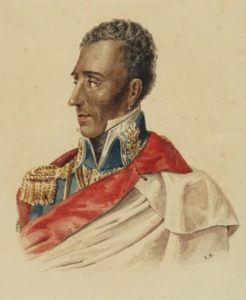
Jean-Pierre Boyer
*Jean-Pierre Boyer was born on this date in 1776. He was a Black soldier and politician.
Jean-Pierre Boyer was born in Port-au-Prince and was the mulatto son of a French tailor and an African mother, a former slave from Congo. He was sent to France by his father to become educated. During the French Revolution, he fought as a battalion commander against Toussaint Louverture in the early years of the Haitian Revolution. He later allied himself with André Rigaud, also mulatto, in an abortive insurrection to try to keep control of the southern region of Saint-Domingue. After going into exile in France, Boyer and Alexandre Pétion returned in 1802 with French troops.
After it became clear that the French were going to try to reimpose slavery and restrictions, Boyer joined the patriots under Pétion and Jean-Jacques Dessalines, who led the colony to independence. After Pétion rose to power in the Republic of Haiti in the South, he chose Boyer as his successor. He was reportedly influenced by his (and his predecessor's) lover, Marie-Madeleine Lachenais, who acted as his political adviser. 1818 Pétion died, and Boyer replaced him as the second President of the Republic of Haiti. This was an arranged transition since Pétion had selected Boyer for his succession, and the Senate approved his choice.
As soon as Boyer came to power, he was confronted with the continuing competition with Henri Christophe and the Kingdom of Haiti in the north. Christophe's autocratic rule created continued unrest in the Kingdom of Haiti. After his soldiers rebelled against him in 1820, in failing health and fearing assassination, Christophe committed suicide. Boyer reunited Haiti without a single battle. When Santo Domingo became independent late in 1821, Boyer quickly gained control, uniting the island under his rule by 1822. Boyer believed Haiti had to be acknowledged as an independent nation and that this could be established only by cutting a deal with France. He was anxious to eliminate their threat and opened negotiations.
On July 11, 1825, Boyer signed an indemnity with France in exchange for recognizing Haitian Independence. It stated that France would recognize Haiti as an independent country in return for 150 million francs paid within five years. While this sum was later reduced to 90 million francs (in 1838), it was a crushing economic blow to Haiti. Boyer had to negotiate a loan from France of 30 million francs to pay the first part of the indemnity. Meanwhile, most of the rural Haitian population was retreating into an agricultural subsistence pattern.
He tried to enforce the semi-feudal fermage system to increase agricultural productivity on the island, but the people resisted being tied to other people's lands. With the Rural Act, Boyer resurrected a land distribution program. He broke up some large plantations and distributed land to the small farmers. The government "tied" the rural population to their small holdings and established production quotas to produce enough products for export to generate revenue. This deal with France was a tactical error that left the island country in fiscal debt well into the 21st century and persists today.
Exile and death
Boyer ruled the island of Hispaniola until 1843 when an earthquake worsened the poor economic situation. In late January, the disadvantaged majority rural population rose under Charles Rivière-Hérard. In February 1843, Boyer fled Haiti to nearby Jamaica. He eventually settled in exile in France, where Jean-Pierre died in Paris on July 9, 1850. Descendants of Boyer still live in Haiti.